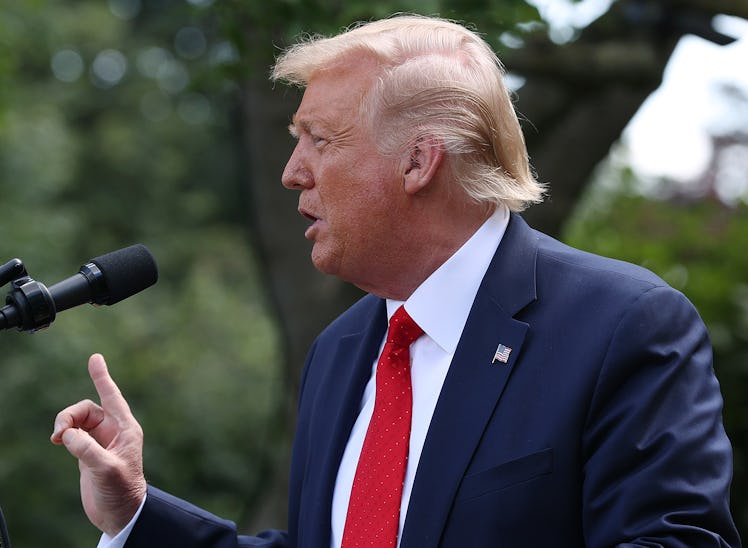
Donald Trump's Quotes About Defunding The Police Make His Stance Clear
As protests against police brutality continue across the country, so do calls to overhaul policing in the United States. Activists involved in movements to demilitarize police departments are also demanding that city councils defund — and in some cases, ultimately abolish — police, in favor of investing in community-based resources. This movement to defund the police has gained significant traction among progressives, especially young people, but it has not received nearly as much support from 2020 presidential contenders. What is President Donald Trump's stance on defunding police? He's repeatedly criticized these demands.
During a June 8 meeting with law enforcement leaders at the White House, Trump told police chiefs from around the country that "there won't be defunding" of police departments. "There won’t be dismantling of our police, and there’s not going to be any disbanding of our police," the president said. "Our police have been letting us live in peace, and we want to make sure we don’t have any bad actors in there." Trump went on to describe 99% of police officers as "great people," per The Hill.
More than a month later, as calls to defund and abolish the police continue to escalate, Trump dismissed these calls as a "fad" during a speaking engagement in Florida. According to Politico, Trump told leaders at the U.S. military's Southern Command on July 10 that "we will never, ever defund our police."
“What's going on here, admiral, when you hear ‘defund the police,’ you are probably saying it's a foreign language, right?” Trump said. “So, just a terrible thing, but I assume this is going to be a fad. We’ll call it a fad.”
Trump is so opposed to defunding the police that he has weaponized calls from progressive groups to do so against the presumptive Democratic nominee in the 2020 presidential election — former Vice President Joe Biden. In an ad aired on July 2, Trump's re-election campaign alleged that "Joe Biden's supporters are fighting to defund police departments" and subsequently argued that "you won't be safe in Joe Biden's America." The ad specifically references Biden's supporters, because Biden himself, as PolitiFact reported, is also opposed to defunding the police. Biden told CBS News in June 2020 that he supports "conditioning federal aid to police, based on whether or not they meet certain basic standards of decency and honorableness," but that he did not support defunding police departments.
The president doubled down on the subject of funding the police in a rambling July 14 press event at the White House Rose Garden, at which he suggested that Biden wanted to defund the military and associated defunding police with illegal immigration into the United States. "Unlike Biden, we don’t want to have criminals pouring into our country. We don’t want to have open borders," he said at the event. "And we want to take care of our police. We want to actually fund our police, not defund them. And we’re not going to abolish our police." Border security is largely overseen by U.S. Customs and Border Protection under the Department of Homeland Security, and is separate from local law enforcement, which is typically funded by states and local governments.
Contrary to some of Trump's comments on the matter, calls to "defund the police" don't mean that communities would be left without help in an emergency. Instead, the movement advocates to shrink police departments and redirect the resources to support other services, ultimately moving away from the one-size-fits-all solution of policing to address everything from mental health crises to violent crime to traffic violations. While individual communities would likely reallocate resources based on their respective needs, some suggestions for where police money could go instead include social services, education funding, and housing. Some activists also want to take the further step of fully abolishing police departments and the prison-industrial complex, instead of merely downsizing it.
As the national discussion about police violence and structural racism continues, American voters are likely to see this issue play a significant role in the upcoming 2020 presidential election. Whether or not Trump thinks it's a fad — it's not likely to go away.
This article was originally published on